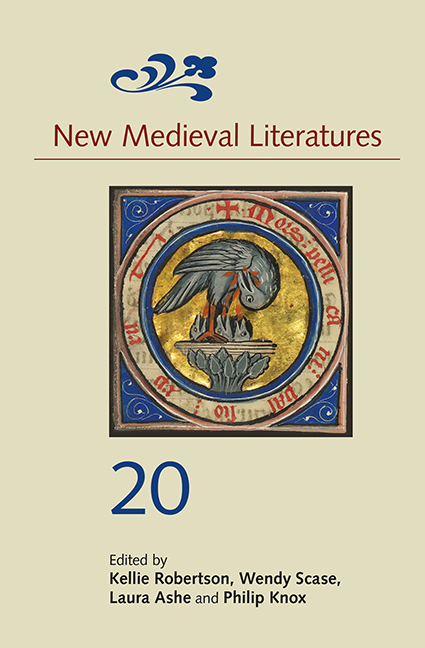Book contents
- Frontmatter
- Contents
- List of Illustrations
- List of Abbreviations
- 1 Lion-Keu-Coupé: A Missing Link in Yvain or Le Chevalier au Lion
- 2 John of Howden’s Rossignos and the Sounds of Francophone Devotion
- 3 ‘Wereyed on every side:’ Chaucer’s Troilus and Criseyde and the Logic of Siege Warfare
- 4 ‘Ave ave ave [ave]:’ The Multilingual Poetics of Exuberance in Bruder Hans
- 5 Performative Typology, Jewish Gender and Jesus’s Queer Romance in the York Corpus Christi Plays
- 6 Locating Charles d’Orléans: In France, in England and Out of Europe
- 7 Urinals and Hunting Traps: Curating Fifteenth-Century Pragmatic Books
3 - ‘Wereyed on every side:’ Chaucer’s Troilus and Criseyde and the Logic of Siege Warfare
Published online by Cambridge University Press: 30 April 2020
- Frontmatter
- Contents
- List of Illustrations
- List of Abbreviations
- 1 Lion-Keu-Coupé: A Missing Link in Yvain or Le Chevalier au Lion
- 2 John of Howden’s Rossignos and the Sounds of Francophone Devotion
- 3 ‘Wereyed on every side:’ Chaucer’s Troilus and Criseyde and the Logic of Siege Warfare
- 4 ‘Ave ave ave [ave]:’ The Multilingual Poetics of Exuberance in Bruder Hans
- 5 Performative Typology, Jewish Gender and Jesus’s Queer Romance in the York Corpus Christi Plays
- 6 Locating Charles d’Orléans: In France, in England and Out of Europe
- 7 Urinals and Hunting Traps: Curating Fifteenth-Century Pragmatic Books
Summary
Geoffrey Chaucer's Troilus and Criseyde is a narrative of war that disavows any interest in recounting the events of war. Set towards the end of the Trojan War, Chaucer's tale turns its back on valorous deeds and bloody battles in favour of the love affair between a Trojan prince and a beautiful widow, Troilus and Criseyde. This attitude is epitomized by a line from the opening of the poem that Chaucer closely translated from Giovanni Boccaccio's Il Filostrato: ‘The thynges fellen, as they don of werre’ (1.134). Things happened, as they do in war: armies attacked the city, the city fought back; pitched battles occurred, soldiers died; the war of attrition continued. The events of the Trojan War are ‘wel wist’ (1.57), and it is not Chaucer's task or his intention to recapitulate what we already know about the war. This idea is repeated at the end of the poem, where Chaucer states that if he had intended to write ‘The armes of this ilke worthi man, / Than wolde ich of his batailles endite; / But for that I to writen first bigan / Of his love, I have seyd as I kan’ (5.1765–1769). If Chaucer had meant to write about Troilus’ military endeavours, then he would have done so, but his focus has been on Troilus the lover, not Troilus the soldier. For those readers wishing to learn about the ‘worthi dedes’ of Troilus, Chaucer writes, they should turn to Dares, author of a supposedly reliable account of the Trojan War. The echo of the Aeneid's opening line, ‘Of arms and the man I sing’ [arma virumque cano], in Chaucer's reference to ‘The armes of this ilke worthi man’ serves to reinforce the distance between Chaucer and the literary tradition that venerates the deeds of war.3 In place of ‘his batailles’, Chaucer chooses instead ‘his love’.
Yet the gap between Troilus's ‘love’ and his ‘batailles’, between the amorous quest of love and the military quest of war, is not that great.
- Type
- Chapter
- Information
- New Medieval Literatures 20 , pp. 74 - 106Publisher: Boydell & BrewerPrint publication year: 2020



